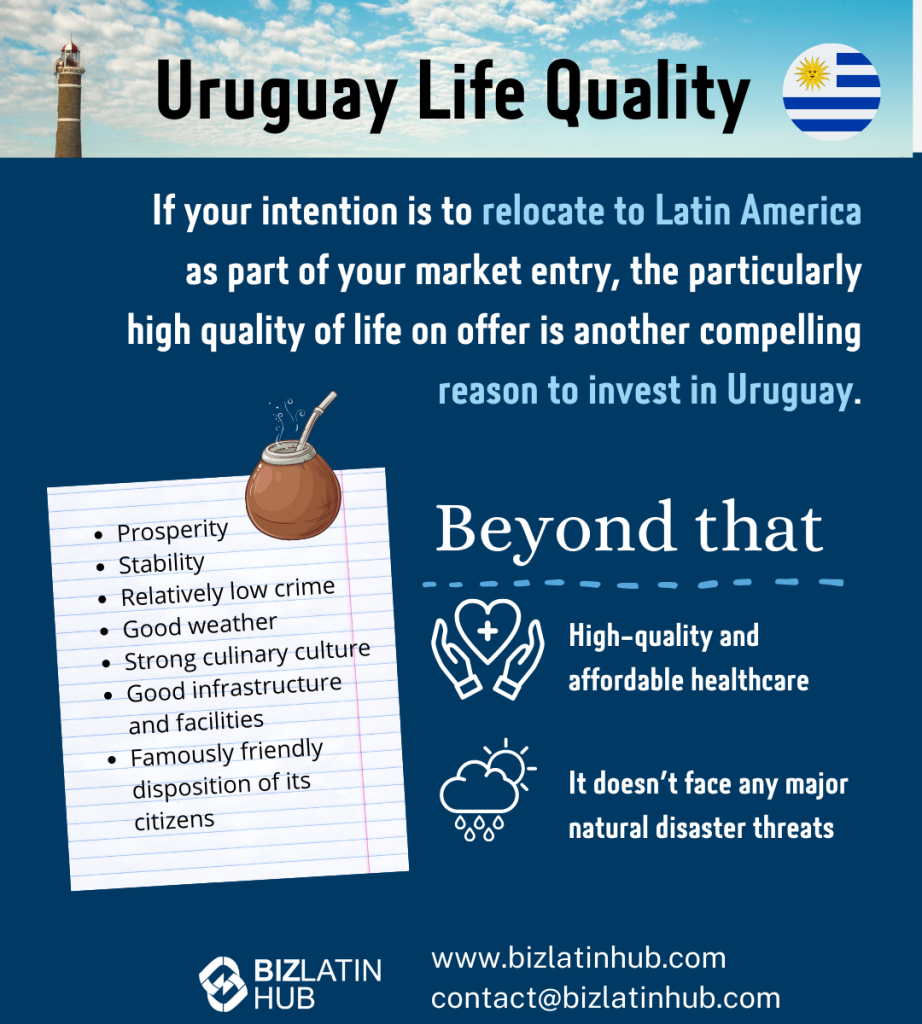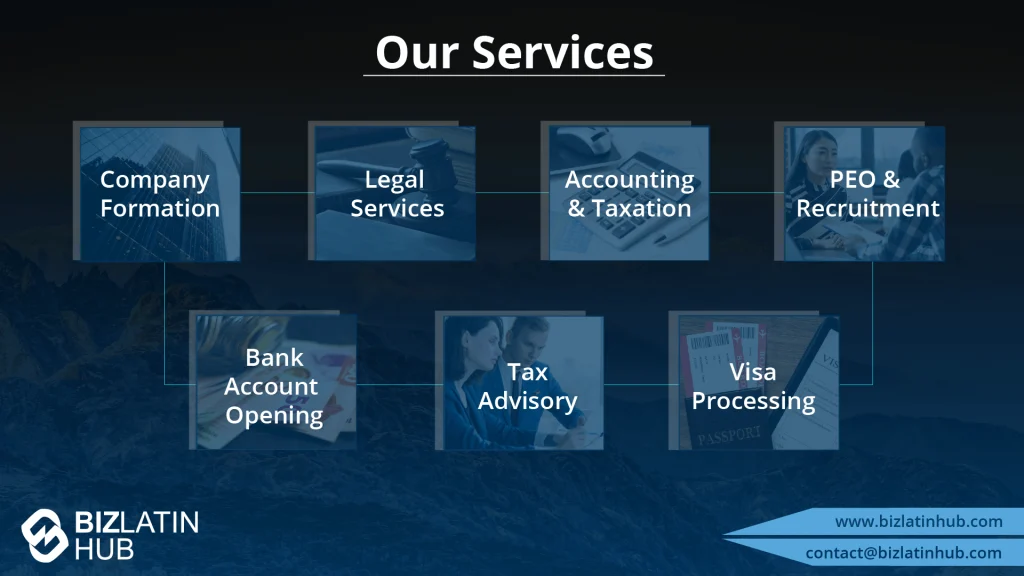Uruguay maintains a stable fiscal and monetary policy, which has fostered investor confidence and economic growth. This stability has allowed the government to manage inflation and maintain low levels of public debt.
The government is focused on securing a free trade agreement with China this year which will be a big boost for the Uruguay business sector. Another positive is that the European Union (EU) recently removed Uruguay from its grey list of countries under scrutiny for tax avoidance.
As its tourism industry recovers, and its agriculture and meat exports remain strong, Uruguay is an attractive destination for foreign investment.
However, establishing a footprint in this market can be complicated, so using an employer of record in Uruguay is one of the best ways to ensure your company meets the local regulations.
Let’s take a closer look at the current Uruguay business environment and the benefits of investing in this unique South American country.

Why is Uruguay good for business?
Despite the ongoing unfavorable global economic conditions, Uruguay continues to be a leading market in Latin America.
It was recently ranked #5 out of 137 countries on the BTI Transformation Index, ahead of any other Latin American country. The index analyzes and evaluates how countries are steering social change toward democracy and a market economy.
It is a founding member of the Mercosur trade bloc, which aims to create commercial and investment prospects by integrating national economies into the global market. This gives Uruguay strategic access to other markets across South America, including Brazil, Argentina, Paraguay, Bolivia, and Venezuela.
It is relatively fast and simple to set up a company in Uruguay with the right support. There is no minimum amount of capital needed, except for financial and insurance companies.

5 reasons why Uruguay business is worth investing in
- Stable political landscape
- Location
- Growing economy
- Talent pool
- Booming tech industry
Here are five reasons why Uruguay is an exciting place to do business.
1 – Stable political landscape
Uruguay has one of the most stable democracies in the region. It was ranked 19th out of 194 countries in the 2021 Political Stability Index and leads the way in Latin America.
It also leads the way as the least corrupt country in the region, Uruguay was 21st on the latest Transparency International corruption perceptions list. The next LATAM country was Chile which ranked 27th while Costa Rica was the only other country to make the top 50.
2 – Location, location, location
Uruguay’s strategic geographical location offers numerous advantages for trade and commerce. With a coastline that allows it to accommodate maritime trade, the country boasts one of the most significant ports in South America, Montevideo.
It also shares borders with two influential countries in South America, Brazil, and Argentina. Uruguay’s exceptional infrastructure supports its regional trade and logistics operations across all modes of transportation, including air, land, and sea.
Its favorable location, combined with its robust infrastructure, presents an excellent opportunity for businesses seeking to expand their operations in the region.
3 – Growing economy
Uruguay has experienced steady economic growth over the past decade, emerging as one of the most prosperous nations in Latin America. The country’s growing economy can be attributed to several key factors.
Uruguay has a well-diversified economy, with a mix of sectors contributing to its growth. Services, including tourism, finance, and information technology, are major drivers of the economy. Agriculture and agribusiness industries, particularly livestock and forestry, also play a significant role. Additionally, Uruguay has been exploring renewable energy sources such as wind and solar power, further diversifying its economic portfolio.
In addition, the Latin American country has actively pursued a policy of trade integration. It has signed numerous free trade agreements, most notably with Mercosur (a regional trade bloc) and the European Union. These agreements have increased access to foreign markets, attracting foreign investment and supporting export-oriented industries.
4 – Tech talent pool
Uruguay has a population of nearly 3.5 million and an adult literacy rate of over 98 percent. This ranks it first in South America and 33rd in the world.
Over the past few years, Uruguay has become well-known for its excellent software developers. There are now over 500 tech companies in the country which has fuelled incredible growth in a highly skilled IT workforce.
This tech talent pool offers a low-cost alternative for North American companies and the timezone crossover fits perfectly for nearshoring opportunities.
5 – Booming tech industry
In November 2022, Uruguayan President Luis Lacalle Pou announced a new program to develop the country as a hub for innovation and entrepreneurship.
Between the software and ICT services, Uruguay’s exports have amounted to around one billion dollars. It is the top software exporter per capita in South America.
The government is working with partners such as Microsoft to develop artificial intelligence, 5G, the Internet of Things, and more. Uruguay’s growing tech industry offers exciting opportunities for foreign investment.

What are the top Uruguay business industries?
- Agriculture – The agriculture industry accounts for 12 percent of the country’s total GDP and 70 percent of exports. Its main products are rice, soybeans, maize, wheat, citrus fruits, and apples.
The government has boosted the agricultural sector with favorable policies like no limitations or restrictions on the export of agro-industrial goods.
- Fintech – Uruguay rose 46 positions to 17th in Global Fintech Index in 2021. This rapid growth led to Uruguay having its first fintech unicorn in dLocal (valued at almost $USD 9 billion.)
Uruguay business digital payment transactions are expected to reach a value of USD$2,241 million. The growth in fintech has led to some calling Uruguay… the “Switzerland of South America.”
- Tourism – Prior to the pandemic tourism was one of Uruguay’s brightest industries. And while the numbers haven’t yet recovered to pre-pandemic levels, it is projected to grow.
The country’s tourism strategy focuses on promoting sustainable tourism, preserving its natural beauty, and showcasing its rich cultural heritage. In recent years, the government has invested in improving infrastructure, promoting ecotourism, and expanding international connectivity, which has contributed to the industry’s growth.
Biz Latin Hub can help kickstart your Uruguay business
If you’re looking to establish and conduct business in Uruguay, Biz Latin Hub can be your trusted partner.
Our Montevideo-based team of bilingual corporate support specialists can tailor a service package to meet your specific needs. Our services range from accounting and taxation, company formation, legal support, hiring, and PEO.
To discover more about how we can assist your Uruguay business and operations across Latin America, contact our expert team today.






